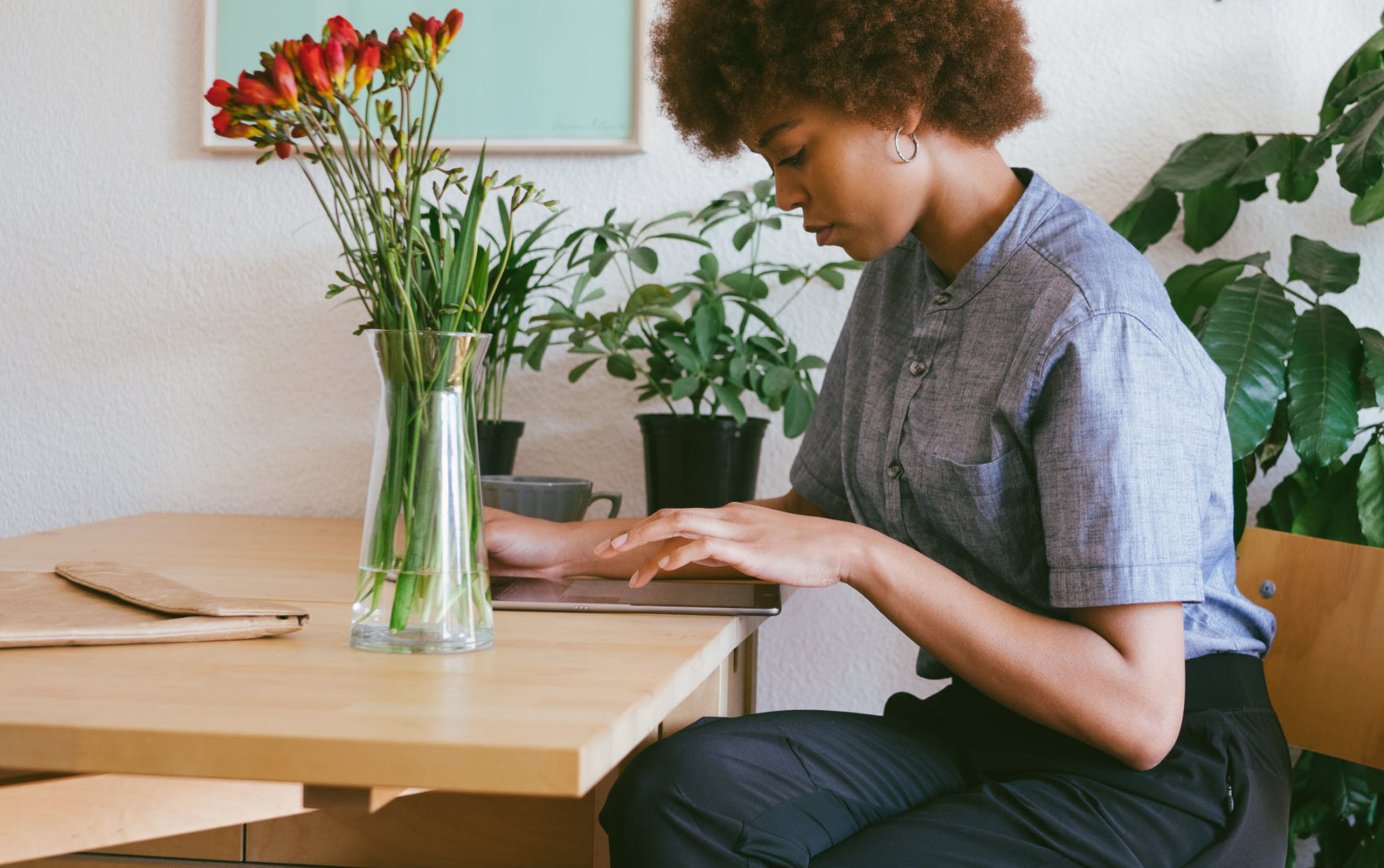Although the speed of recent changes for us all has been breathtaking, learning how to be productive when working from home is not new.
Given that so many leaders, perhaps including you, are suddenly facing the challenge of working from home as a new normal, it seems only fair to share what I've learned in the nearly six years since I launched this blog and my business.
I’ll start with the basics. What I’ve learned about creating and protecting a productive place to work in a home that you probably didn’t buy or furnish for this purpose. Let’s think about your working space and behavior.
1. Environment matters
Once you start to work for prolonged hours at home, you notice how different your environment is to the office. Noise, interruptions, distractions, discomfort or too much comfort – all can be issues.
Your working space
I can recall early on learning that just trying to use the dining room table was a bad idea. Too many distractions and through traffic. As we learned from Cal Newport in his book “Deep Work,“ it is vital to have a working space that is conducive to concentration and minimizes distraction.
My next location was working in one of my children’s old bedrooms (fortunately we’ve reached a life stage when they’ve all moved out). This was better, but still had the feel of a bedroom. A room designed for comfort and snoozing is not the visual cue you need when reading, writing, planning or making key decisions.
One advantage of working in an old bedroom is the simple device of a door that closes. This is important psychologically as well as physically. I encourage you to close the door and to tell others in your household that when the door is closed you shouldn’t be disturbed unless it’s urgent. Some fellow business owners I know even use a Do Not Disturb sign.
Transforming your home office
Over the years, I have gradually invested in transforming the space around me. Aspects that have helped (in creating a space that helps me focus and get more done) include:
- Filing cabinets and bookshelves (less cognitive load if less cluttered)
- In trays and a filing system for prioritization of printed material
- A clear desk space, only containing what is needed for the current task
- Notice boards with longer-term dashboards and reminders in sight
- A wall planner with colored dots to help me see the year visually
- Clear floor space for standing and pacing to think or take calls
- Digital Minimalism
Different people will find different aspects of my approach work for them. Having chatted to many others who work from home, I don’t believe there is one right answer. What matters is that you stay aware of when you are distracted or when tasks take longer than they could.
Be honest with yourself, and, where a more conducive environment would help improve your focus, take action. When you are going to be working in the same space for a long time, even small improvements can give you huge cumulative gains.
2. Habits and your routine matter
I’ve learned that I can’t rely on my motivation and consistency every day. It’s human nature that we have days when we feel ready to take on the world and others when we’d rather stay in bed. For me, it’s proved better to focus on developing routines and habits than to rely on motivational posters or "getting pumped" pep talks.
“Atomic Habits” by James Clear confirms much of why certain changes have worked well for me and others have not. That book will really help you develop good habits and stop bad ones.
My journey with planners
My own journey down this path started with wanting to improve on my to-fo List. I’ve shared before how my personal system for task prioritization and diary management has developed with the help of Peter Bregman and Michael Hyatt. Those principles still serve me well.
Building on that habit of planning my day and prioritizing what matters most, for a few years I invested in Michael Hyatt’s Full Focus Planner. This did help establish a number of good habits for me, including getting clear on my "big three" each day and reviewing my week.
See also: COVID-19’s Impact on Delivery of Care
The big three
The concept of the big three is to review everything you’d like to get done and be forced to choose which three matter most. This means considering what impact completing those will achieve (so, important not just urgent). You commit before you start your day to the idea that, if they are all you get done today, it has been a success. It’s surprising how much this helps, especially for a natural self-critic like me. There are more "win days."
A weekly review
Weekly reviews are another habit that was driven by that planner, which for me is completed every Sunday. Taking time to review wins and distractions over the last seven days, as well as what I could do differently. The review also prompts you to think about all aspects of your life.
Since those years investing in the Full Focus Planner, I found it to be too expensive a subscription for the benefit. At present, I’ve replaced it with the Lux Productivity Planner (which covers six rather than three months) and am seeing the same benefits. You’ll note I’m sure that I’ve stayed with a paper-based planner. I encourage you to think about the benefit of doing the same. Not relying on solely digital systems can help you in a number of ways. For me it helps me step back and recall better.
Establishing routines that serve you
Finally, one other habit that I have learned along this journey is the importance of establishing a morning routine and an evening routine. This will differ for everyone but should include those things you want to do consistently (so need to make into unconscious habits). Repetition and environment are your friends again here, and I encourage you to practice defining these and honing them to work for you.
For example, my morning routine includes:
- A calm start with tea and radio
- Regular exercise
- Meditation and spiritual time
- Planning my day
- Checking with others and then going into "the office" to start work
Over time, I’ve also developed both "start of work" and "end of work" routines. These can help include aspects like managing your email, social media content, reminders/tasks and finance/CRM systems. They also help to act as behavioral bookends to my working day, making it easier for me to relax afterward.
3. Your whole self matters
It is easy to fall into the trap of only thinking about your mental activity as if you are a robot. But too much self-neglect has taught me that it is so important to think more holistically. If you are going to be sustainably productive, even in the medium term, you need to look after yourself.
Others are more qualified to talk on each of these topics than I am, but my own mistakes have taught me to take care of all these aspects:
- My physical self (exercise, diet and hydration)
- My emotional self (celebrate wins, interact with others, open up)
- My spiritual self (take time to reflect on meaning in what I do)
- My social self (keep in touch with others and not just by email)
Taking care of physical you
The first of these, taking care of your body, can also be helped by a few simple changes to how you work. Sadly, my morning routine does not now include sociable badminton, but for me still means running and yoga at home. I’ve shared before on some apps that help me.
In your home office, also beware of becoming so absorbed that you don’t notice how long you are sitting. It really is bad for your body and energy-sapping. I’ve shared before how much a standing desk helped mem and I’m still benefiting from that investment two years later. I also use my Apple Watch to prompt me to stand at least every hour (normally a prompt to leave my office to get a drink and chat with my wife).
So, I encourage you to watch out for becoming too sedentary. Of course, we should also turn to diet. Now, I would be a hypocrite if I tried to preach to others about diet – after all, I’m a middle-aged man who enjoys food and drink, which shows. But, suffice to say that I have discovered that more vegetarian meals do improve my energy levels.
See also: Impact of COVID-19 on Workers’ Comp
The main lesson I’m learning is about hydration. So, my final tip for looking after the physical you is to always have a water bottle on your desk. If you feel hungry (a big potential bad habit when working at home), try drinking water, instead. If you feel tired, before you have yet another coffee try drinking water. Drinking water is really helping me as it becomes a habit.
That’s enough for now. In my following posts, I will share more on looking after the emotional, spiritual and social you. I’ll also share posts on recommended hardware, software and other equipment to help you be more productive at home.
Keep safe, and please keep in touch.








